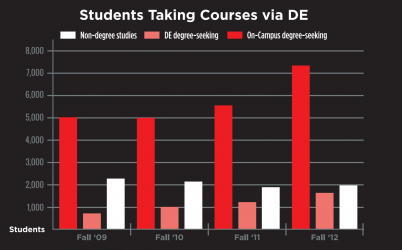Blurring the Lines: Examining the Impact of the DE Tuition Change

When full-time, on-campus students registered for fall 2012 Distance Education (DE) courses, for the first time in more than a decade they didn’t wince at the additional cost. For them, the price tag for taking their class in a lecture hall or taking it online was exactly the same. As a result, the percentage of the on-campus student population taking one or more online courses increased by one-third, jumping from 18 to 24 percent of the student population. Looking just at the undergraduate population, there was a startling 44 percent increase in the number of full-time, degree-seeking students who enrolled in a DE course.
In a world where costs only go up, why did taking a Distance Education course just get cheaper for some students? The answer lies in a change set in motion by the Provost’s Distance Education Task Force. The task force was asked to examine, among other things, the NC State tuition model and recommend solutions to eliminate the tuition penalty for full-time, on-campus students taking some DE courses. They recommended, and it was approved, that tuition for on-campus degree-seeking students should be the same regardless of the course format.
“We’ve had concerns for years about the inequities resulting from the different tuition models for campus and online courses,” said Dr. Tom Miller, vice provost for DELTA. “When those models were put in place, no one expected Distance Education courses to be so popular among our on-campus students. We had to do something to fix the inequities.”
The rush to sign up for DE courses begs the following question: “Why do so many on-campus students want to take courses online?” The reasons vary quite a bit. Some students take DE courses to accommodate schedule conflicts with their job or other courses. Some take DE courses because they learn better in an online environment. Some take DE courses because campus sections are filled and they don’t want to delay a course until the next semester.
A survey of NC State students enrolled in a fall 2012 Distance Education course showed that 66 percent of students listed “progress toward degree/certificate” as one of the main reasons for taking a DE course. In other words, taking courses via Distance Education allows on-campus students to maintain steady progress toward their degree, leading to more efficient graduation rates. Given this survey result, we conclude that by eliminating the tuition penalty for Distance Education courses, students can complete their degree programs and earn their diplomas more quickly.
“NC State’s strategic goal of enhancing student success through educational innovation was a critical driver in getting the new tuition policy approved and implemented,” Miller said. “We have seen an uptick in the average number of credit hours taken by full-time, degree-seeking students after the change, so it has made a positive impact on progress toward degree.”
“Our challenge now is meeting the increased demand for online courses from on-campus students,” Miller said. “Our courses are filling to capacity immediately after registration opens, leaving many students unable to enroll in the online courses they desire. The problem is exacerbated by the budget cuts the university had endured in recent years, but I’m hopeful that we will be able expand online offerings in the future as budgets catch up.”
Read More
For more DELTA stories like this one, explore the DELTA Annual Report 2012-2013.
- Categories:



